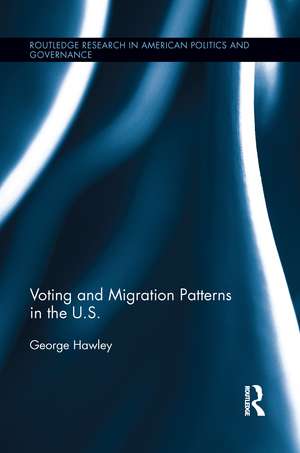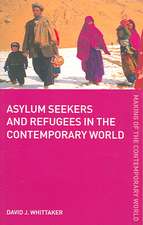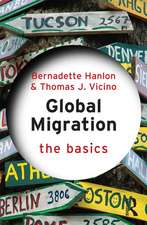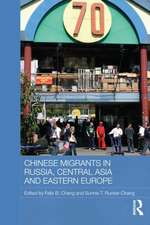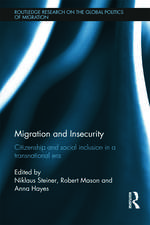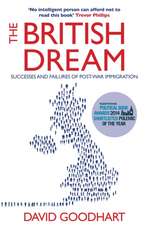Voting and Migration Patterns in the U.S.: Routledge Research in American Politics and Governance
Autor George Hawleyen Limba Engleză Paperback – 8 sep 2015
Examining individual and aggregate data and employing a large number of statistical methods, George Hawley explores the increasing political homogenization of small geographic units and explains the causal mechanisms driving this phenomenon as well as its consequences for individual political attitudes and behavior among residents residing in these geographic units. He argues that some partisans are self-selecting into communities of likeminded partisans, causing some areas to become overwhelmingly Republican and others to become overwhelmingly Democratic. The book also notes that the migratory patterns of Republicans and Democrats differ in systematic ways for other reasons, due to the different demographic and economic characteristics of these partisan groups.
At a time when many studies argue that a large percentage of the electorate is self-selecting into communities based on their political preferences, this bookshelf essential presents a much needed account on the different migratory patterns of Republicans and Democrats and how these patterns are shaping the geography of American politics.
| Toate formatele și edițiile | Preț | Express |
|---|---|---|
| Paperback (1) | 230.75 lei 6-8 săpt. | |
| Taylor & Francis – 8 sep 2015 | 230.75 lei 6-8 săpt. | |
| Hardback (1) | 703.79 lei 6-8 săpt. | |
| Taylor & Francis – 2 iul 2013 | 703.79 lei 6-8 săpt. |
Din seria Routledge Research in American Politics and Governance
-
 Preț: 317.04 lei
Preț: 317.04 lei - 8%
 Preț: 383.74 lei
Preț: 383.74 lei -
 Preț: 311.41 lei
Preț: 311.41 lei -
 Preț: 310.31 lei
Preț: 310.31 lei -
 Preț: 251.32 lei
Preț: 251.32 lei -
 Preț: 231.89 lei
Preț: 231.89 lei - 29%
 Preț: 706.27 lei
Preț: 706.27 lei -
 Preț: 362.05 lei
Preț: 362.05 lei -
 Preț: 365.32 lei
Preț: 365.32 lei - 18%
 Preț: 999.51 lei
Preț: 999.51 lei -
 Preț: 381.21 lei
Preț: 381.21 lei -
 Preț: 94.48 lei
Preț: 94.48 lei - 30%
 Preț: 847.31 lei
Preț: 847.31 lei -
 Preț: 358.62 lei
Preț: 358.62 lei - 31%
 Preț: 766.42 lei
Preț: 766.42 lei - 18%
 Preț: 1058.52 lei
Preț: 1058.52 lei -
 Preț: 227.86 lei
Preț: 227.86 lei -
 Preț: 487.37 lei
Preț: 487.37 lei - 18%
 Preț: 1000.27 lei
Preț: 1000.27 lei -
 Preț: 385.08 lei
Preț: 385.08 lei - 18%
 Preț: 1058.79 lei
Preț: 1058.79 lei -
 Preț: 369.73 lei
Preț: 369.73 lei -
 Preț: 493.12 lei
Preț: 493.12 lei -
 Preț: 385.84 lei
Preț: 385.84 lei -
 Preț: 383.12 lei
Preț: 383.12 lei - 18%
 Preț: 728.79 lei
Preț: 728.79 lei -
 Preț: 460.47 lei
Preț: 460.47 lei - 26%
 Preț: 849.48 lei
Preț: 849.48 lei - 18%
 Preț: 1004.20 lei
Preț: 1004.20 lei -
 Preț: 480.62 lei
Preț: 480.62 lei - 18%
 Preț: 1009.60 lei
Preț: 1009.60 lei -
 Preț: 381.98 lei
Preț: 381.98 lei -
 Preț: 365.69 lei
Preț: 365.69 lei
Preț: 230.75 lei
Nou
Puncte Express: 346
Preț estimativ în valută:
44.17€ • 47.99$ • 37.13£
44.17€ • 47.99$ • 37.13£
Carte tipărită la comandă
Livrare economică 21 aprilie-05 mai
Preluare comenzi: 021 569.72.76
Specificații
ISBN-13: 9781138100435
ISBN-10: 1138100439
Pagini: 188
Ilustrații: 20 black & white illustrations, 12 black & white tables
Dimensiuni: 152 x 229 x 11 mm
Greutate: 0.28 kg
Ediția:1
Editura: Taylor & Francis
Colecția Routledge
Seria Routledge Research in American Politics and Governance
Locul publicării:Oxford, United Kingdom
ISBN-10: 1138100439
Pagini: 188
Ilustrații: 20 black & white illustrations, 12 black & white tables
Dimensiuni: 152 x 229 x 11 mm
Greutate: 0.28 kg
Ediția:1
Editura: Taylor & Francis
Colecția Routledge
Seria Routledge Research in American Politics and Governance
Locul publicării:Oxford, United Kingdom
Public țintă
PostgraduateCuprins
Introduction. Part I: Migration and Partisan Self-Selection 1. Geographic Segregation in the United States 2. A Theory of Geographic Partisan Sorting 3. Geographic Partisan Sorting: Empirical Evidence Part II: Migration and Political Change 4. The Geography of Family Formation 5. Race and Migration as a Source of Political Diversity and Homogeneity 6. Occupation as a Source of Political Diversity and Homogeneity Part III: A Case Study 7: Harris County, TX: Political Segregation in the Nation’s Largest Swing County. Conclusion
Notă biografică
George Hawley is Assistant Professor of Political Science at the University of Alabama. His research interests include demography, electoral behavior, political parties, immigration policy, and the U.S. Congress.
Recenzii
"Where we choose to live is clearly affecting our politics. George Hawley tells how migration is shaping the vote by explaining why Americans live where they do today."
—Bill Bishop, co-author of The Big Sort: Why the Clustering of Like-Minded America Is Tearing Us Apart
"George Hawley has made a major contribution to renewed interest in political demography with his new book. He ably reviews the recent literature that documents some of the most prominent consequences of 21st century demography. Hawley’s analysis reveals how major demographic shifts in marriage and family formation, urban-rural divergence, and racial-ethnic population movement are important aspects of these political shifts. He demonstrates there is evidence that, for a growing number of Americans, the desire to live in neighborhoods where their social and political values are congruent with their neighbors is a contributing factor to the geographic polarization that now overlaps with partisan polarization in America. For scholars and citizens interested in the driving forces of political change in the United States, this book is a must-read."
—Richard W. Murray, University of Houston
—Bill Bishop, co-author of The Big Sort: Why the Clustering of Like-Minded America Is Tearing Us Apart
"George Hawley has made a major contribution to renewed interest in political demography with his new book. He ably reviews the recent literature that documents some of the most prominent consequences of 21st century demography. Hawley’s analysis reveals how major demographic shifts in marriage and family formation, urban-rural divergence, and racial-ethnic population movement are important aspects of these political shifts. He demonstrates there is evidence that, for a growing number of Americans, the desire to live in neighborhoods where their social and political values are congruent with their neighbors is a contributing factor to the geographic polarization that now overlaps with partisan polarization in America. For scholars and citizens interested in the driving forces of political change in the United States, this book is a must-read."
—Richard W. Murray, University of Houston
Descriere
There is concern that American communities are becoming increasingly politically homogenous and this is because Americans are considering politics explicitly when determining where to live. This bookshelf essential presents a much needed account on the different migratory patterns of Republicans and Democrats and how these patterns are shaping the geography of American politics.
